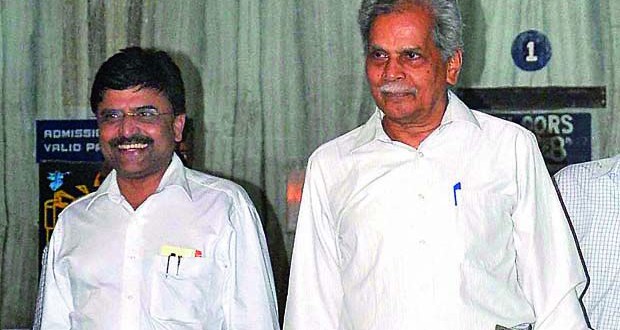The Kamalanathan committee has released the guidelines for allocation of employees between 2 states of Telangana & AP. Telangana employees announced their reservations on the guidelines and said the committee hasn’t considered any of their representations over injustice being done to Telangana employees. Among the many issues they raised over the guidelines are the options being given to employees to choose the state they serve and when considering nativity as one criterion, limiting it to seven years of continuous education. Telangana emplyees also faulted placing Principal Secretary of AP Govt. as the nodal officer to monitor the distribution of employees. The monitoring too would be done from AP Secretariat.
“The guidelines show clear partiality towards Seemandhra employees. The nodal officer who was appointed to monitor the distribution of employees works as principal secretary of AP government. How can we expect him to do justice to Telangana employees? We want a nodal officer who does not belong to either Telangana or AP, ” said A. Padma Chary, Telangana employees’ leader.
On the other hand, AP employee leaders welcomed the guidelines. “We welcome the guidelines. They are in tune with the commitments made in the AP Reorganisation Act 2014. The Act approved in Parliament clearly states that ‘options’ will be given to employees. Those opposing options should have done it in the beginning itself before the Act was made. Even, with regard to nativity, there are clear provisions under Article 371(d) over who is a native. There is no point in raising a hue and cry over this issue now,” said P. Ashok Babu, president, APNGOs Association.
Here are the guidelines and the allocation mechanism to be followed in distribution of around 50,000 employees between 2 states.
Principles guiding Allocation
a) Persons who immediately before the appointed day are serving on substantive basis in connection with the affairs of the existing State of Andhra Pradesh shall be considered for allocation. Employees holding posts on purely ad-hoc basis immediately before the ‘appointed day’ shall be considered against substantive posts (or regular) held by them on the ‘appointed day’ if any.
b) Allocation of employees would be based on final distribution of posts including vacant posts proposed by the Advisory Committee in consultation with the successor States and after approval of the Central Government.
c) Allocable employees shall be considered for allotment between the successor States on the basis of seniority list as available on June 01, 2014.
d) The employees to be allocated would include persons who are absconding, long absentees, those on leave preparatory to retirement or other kinds of leave, those under suspension, persons undergoing training and employees on deputation, including foreign-service deputation. There shall not be any case of an employee not being allocated to either of the successor States.
e) State service employees who hold allocable posts shall be allocated after seeking option from the employees indicating their preference to serve in either of the
successor States after taking their option into consideration. It shall be open to the Central Government to allot the person to any successor State in the administrative interest or in the exigencies of public service.
f) The allocation shall be done in order of seniority as available on June 01, 2014. Those who have opted, who are ‘local candidates’ relatable to the State to which they have opted, shall, in order of their seniority, be considered for allocation first. If allocable posts in that category remain, others will be considered in reverse order of seniority by allotting the junior most.
g) Employees who are not local in relation to both States will be allocated on the basis of nativity / domicile based on due verification and certification of nativity / domicile by the Head of the concerned Department.
h) Employees who are members of the Scheduled Castes or the Scheduled Tribes shall be considered for allocation on the basis of their option, if they are local candidates or domicile. In the event an SC or ST employee has not exercised his option he / she shall be allocated to the State of his / her domicile, as determined based on his / her service register.
i) Class IV employees and drivers of light vehicles shall be allocated on the basis of option or local candidature, as far as possible.
j) Spouse of an All India Service (AIS) officer who is a State government employee shall be allocated, where so desired by the spouse, to the State to which the AIS officer is allocated.
k) Spouses in State government and related state government institutions shall as far as practicable be allotted to the same State, after considering options made by them.
l) Cases of alleviation of extreme personal hardship of State government employees will be exceptions to the principle:
- i) Widowed, legally separated and divorced women employees may be considered for allocation to the State to which option is exercised.
- ii) Handicapped persons of more than 40% disability may be allocated on the basis of option, subject to the procedure prescribed by the State Government.
- iii) The employees who are known to be facing serious medical hardship, in cases of Cancer (self or dependent family), Open Heart / Bye-pass surgery, and Kidney Transplantation / Kidney failure and continuing on dialysis (self) shall be considered for allotment on special grounds on priority on the basis of option, subject to strict proof of verification as per the procedure prescribed by the State Government.
m) Vacant posts allocated to a State shall not be used to allot a person unless there are more employees who are local candidates of that State.
n) Local candidature shall be as defined under the Andhra Pradesh Public Employment Order, 1975 as may be entered in the service record or as certified by the competent authority, with strict reference to the school records. False claim of local candidature or production of false certificate with the intent to mislead shall be punishable as a criminal offence and also be subject to major disciplinary proceedings.
o) Cadre composition with reference to direct recruits/ promotees and recruitments by transfer, and reserved categories of persons as on the appointed day (observed percentage of reservations for different groups) may, as far as practicable, be kept in view while allotting personnel to the two cadres.
p) There are certain departments in which the number of posts in a category in the department is limited, but there are many more persons holding posts in the category 12 on tenure in other departments or on foreign-service deputation. In such cases personnel who are in excess of the sanctioned strength may be distributed between the States duly reckoning the tenure posts or foreign-service posts of the category in the respective States without their being formally added to the cadre strength, for the purpose of allocation of personnel between the states.
q) Where personnel in the seniority list of a category of post is appointed based on subject specialization like in the case of teaching jobs or medical specializations, allotment of posts and personnel in such cases should be subject specialization wise.
r) Officers who have retired/died after the appointed day but before allocation will also be allotted.
s) Employees belonging to allocable categories of one department working in another department or organization on deputation/ tenure basis will be allotted by the parent department of the officer.
t) Local cadre personnel, who are deemed allotted to the State in which the local cadre is situate, working on tenure basis in the Secretariat, Offices of Heads of Department, State Level institutions and Special offices and Establishments and Major Development Projects, as declared under the Presidential Order, will be repatriated to the parent local cadre.
u) Personnel ‘on other duty’ will be reverted to their parent offices or departments for allotment.
v) Candidates who stand allotted by the APPSC or other recruiting agency before the appointed date will be asked to indicate their preference to a State. They will be liable to serve the State to which they are allocated.
w) The Advisory Committee will also consider allocation of State Services Employees in the institutions / centres / corporations, etc., included in Schedule IX and X of the AP Reorganisation Act 2014 and other similar entities on 1 June 2014 while making allocation of employees between the two States.
x) The actual allocation of personnel to States shall be guided by the public interest and the administrative needs of the posts in the states.
y) Posts created subsequent to the appointed day by either State Governments will be reckoned, if so desired by that State, for the purposes of final allotment of state services employees.
z) Notwithstanding the guidelines indicated above the Advisory Committee would be at liberty to consider any principle / factor which may become crucial in deciding the allocation of employees to the successor states subject to approval of the Central Government.
Process of Allocation of Employees
19. The Committee shall follow the procedure herein after mentioned for allocation of employees:
i. All employees would be asked to exercise their options in the prescribed proforma annexed to these Guidelines, and forward their duly filled option forms to the Member Secretary, Advisory Committee, G A State Reorganisation Department, A P Secretariat electronically and through the proper channel indicating their preference for either of the States within two weeks from the date of public notification calling for options.
ii. Letter calling for options shall be given wide publicity through print and electronic media. A copy of the letter shall also be placed in the public domain for wide publicity.
iii. The employees, who are eligible for allocation to either of the successor States asspecified above, will submit their option form addressed to the Member Secretary, Advisory Committee through the respective Administrative Departments of the government in which they are working, to the Andhra Pradesh State General Administration State Reorganization Department.
iv. Scrutiny of statements made in the option forms shall be done and factual accuracy of the statements made therein certified by the head of the department under whom the employee is working. The forms so certified shall be delivered to the GA (SR) Department of the A P Government.
v. If no option is received within the prescribed time, or where an employee is willing to be allotted to either of the two States such person shall be allotted based on the other criteria.
vi. Option once exercised cannot be changed under any circumstance.
vii. After the distribution of posts is finalized, the Advisory Committee will draw up, with the help of the departments concerned and the G A State Reorganization Department of A P Government, a Tentative Allocation List for all employees whether they have exercised option or not. The Member Secretary of the Advisory Committee will circulate the Tentative Allocation List to the respective successor State Governments for information of their employees and for submission of representations, if any, by such employees within a period of two weeks from the date of such communication. The GA State Reorganization Department of AP is required to issue the Tentative Allocation List on behalf of the Advisory Committee. The list shall be widely published and circulated inviting representations of employees against their tentative allocation.
 Telangana Talkies | Leading Telangana News, Movies & Entertainment Portal Website with the latest news from Telangana. We present to the world politics, movies, business updates from Telangana & the capital Hyderabad
Telangana Talkies | Leading Telangana News, Movies & Entertainment Portal Website with the latest news from Telangana. We present to the world politics, movies, business updates from Telangana & the capital Hyderabad




w) The Advisory Committee should also consider allocation of State Services Employees in the institutions / centres / corporations, etc., included in Schedule IX and X of the AP Reorganisation Act 2014 and other similar entities on 1 June 2014 while making allocation of employees between the two States. This should also finished by the end of August 31st 2014.
hI,
THese guideline are applicable to teachers who are working andhra,,???
If wife is zonal employee of AP and husband is state cadre employee . Allotment of husband will be based on his option to AP or not clarify pl
Please share the details regarding the nativity clause…… as per my understanding people who are here in telangana from 1956 are considered are Telanganites… how it is going to be??????????
ADVISE TO KAMALNATHAN COMMITTEE THAT PLEASE CREATE 50% VACANCIES IN TELANGANA STATE AND 50% SUPERMANUARY POSTS IN ANDHRA STATE OR 60:40 RATIO. TELANGANA PEOPLE WHERE FOUGHT FOR BIFURCATION IS NO MEANING. THEREFORE PLEASE ADOPT ABOVE RATIO’S TO SETTLE BIFURCATION GUIDE LINES.